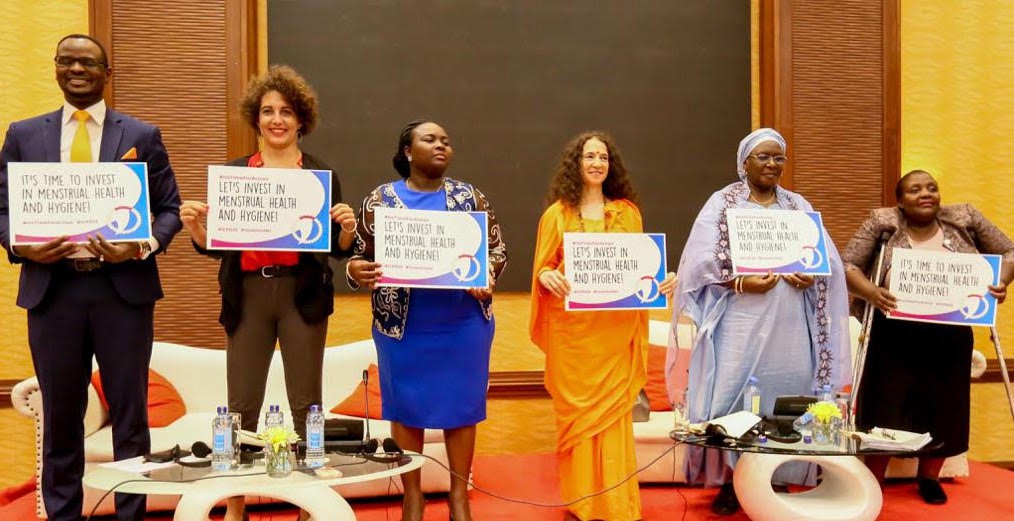In 1994, the International Conference on Population and Development (ICPD) convened 179 governments who, together, agreed on a bold Programme of Action to empower women and girls worldwide.
The Programme of Action addresses important obstacles to the empowerment of women and girls, including lack of access to healthcare, gender-based violence, and sexual and reproductive health and rights. It does not, however, explicitly include menstrual health. When the Programme of Action was created 25 years ago, the global agenda lacked evidence of menstruation’s importance. Since then, it has become clear that menstruation must be a priority in terms of sexual and reproductive health, public health, gender equality, and human rights.
Today, to achieve the goals of the Programme of Action, we must acknowledge the central role of menstruation to women’s and girls’ agency, development, and health. Yet menstrual health is too often overlooked by global policymakers and funders, and is still considered taboo. It’s time for a change.
Last week, on the twenty-fifth anniversary of the creation of the Programme of Action, the governments of Kenya and Denmark and the UNFPA hosted the ICPD25 Nairobi Summit to assess the work yet needed to fully implement the Programme. At the Summit, The Case for Her called for further and more effective investment in women’s and girls’ empowerment by systematically integrating menstrual health into the Sexual and Reproductive Health and Rights (SRHR) agenda.

Menstrual health and hygiene are an integral part of women’s sexual lives and reproductive cycles, and fundamental to SRHR. Menarche, the first period, signals the beginning of puberty and is a vital sign of reproduction: it is a crucial time for adolescent girls to learn about their bodies and health. Without this knowledge, changes in menstrual bleeding, for example, can cause women to discontinue with a contraceptive method, particularly if they believe the lack of bleeding or irregular bleeding to be a sign of long-term infertility. What’s more, medical professionals are increasingly pointing to menstruation as an important predictor and indicator of health — potentially even useful to detect signs of HIV, diabetes, endometriosis and cervical cancer.
To properly address women’s menstrual, sexual, and reproductive health, we must provide local communities with accessible healthcare services and supportive social and physical environments including safe, clean toilets with water and sustainable disposal facilities. We must provide access to accurate, timely, and practical information that addresses stigma and discrimination and enables women to make informed choices about their menstrual practices. In short, we must offer women the tools they need to make their own informed choices for their bodies.
This is why The Case for Her along with other members of the newly formed Global Menstrual Health and Hygiene Collective (MHH Collective) — including the African Coalition for Menstrual Health Management (ACMHM), WaterAid, WASH United and the UN Water Supply and Sanitation Collaborative Council (WSSCC) — commit to the following goals.
- The MHH Collective commits to strengthening our joint advocacy for increased and improved investment in menstrual health and hygiene. We will use our collective power of advocacy to increase funding for menstrual health research and programming, and regularly track funding to ensure accountability towards this commitment. By 2025, 30 countries are committing resources towards menstrual hygiene management.
- Through commitments made by organizations leading up to Menstrual Hygiene Day under the #Action4MHEducation, the MHH Collective commits to reaching 100 million girls by 2025 with information, education and skills around menstruation. We as partners of MH Day continue to advocate for the integration of menstrual health and hygiene management into broader SRHR and public health programs such as comprehensive sexuality education (CSE), throughout the life course, because these are fundamental to autonomy, agency, informed- choice and well-being. By 2025, the MHH Collective commits to mobilizing at least 30 governments to address menstrual health in relevant SRHR, public health and multisectoral policies, strategies and frameworks as part of universal health coverage and the ICPD post-25 agenda.
While the sector has seen significant progress in research and effective solutions especially in menstrual products, female-friendly toilets, education, local government policies, and awareness campaigns, it is not sufficient. More and improved funding is needed to support and scale programming and policies, aided by solidifying and increasing the research and the evidence base.
The time to invest in women and girls is now.
- The Case for Her Teamhttps://thecaseforher.com/blog/author/tcfh-team/
- The Case for Her Teamhttps://thecaseforher.com/blog/author/tcfh-team/
- The Case for Her Teamhttps://thecaseforher.com/blog/author/tcfh-team/
- The Case for Her Teamhttps://thecaseforher.com/blog/author/tcfh-team/


